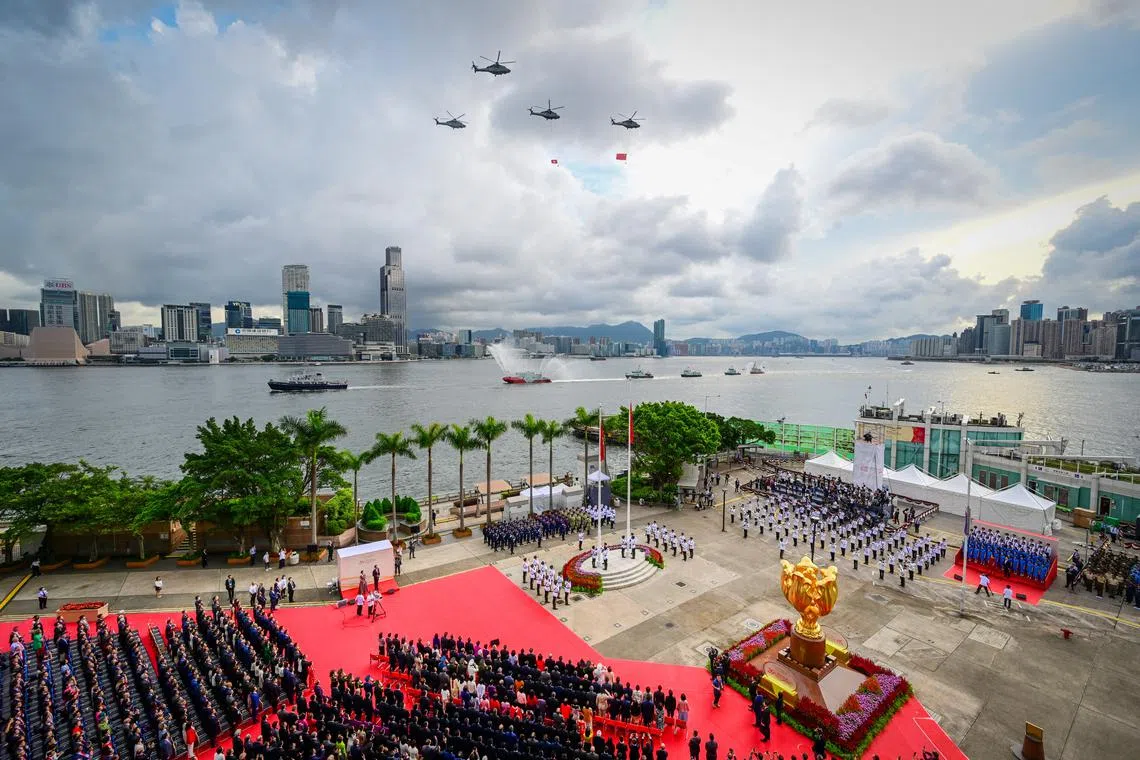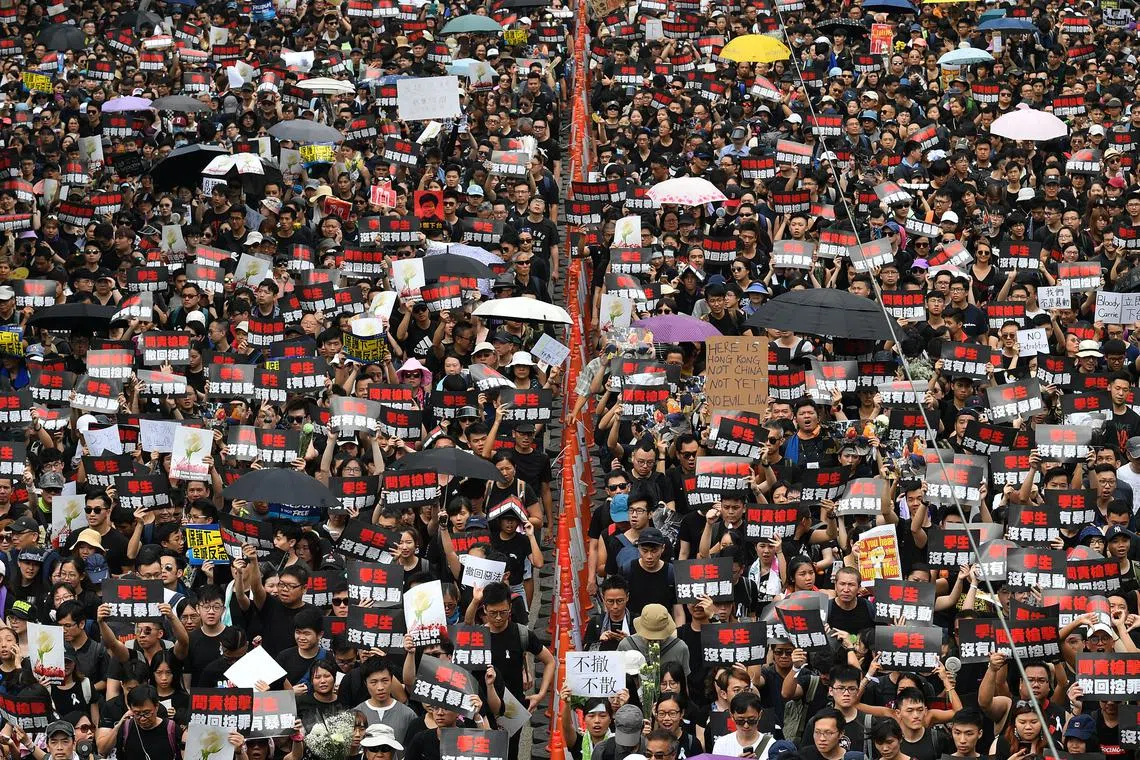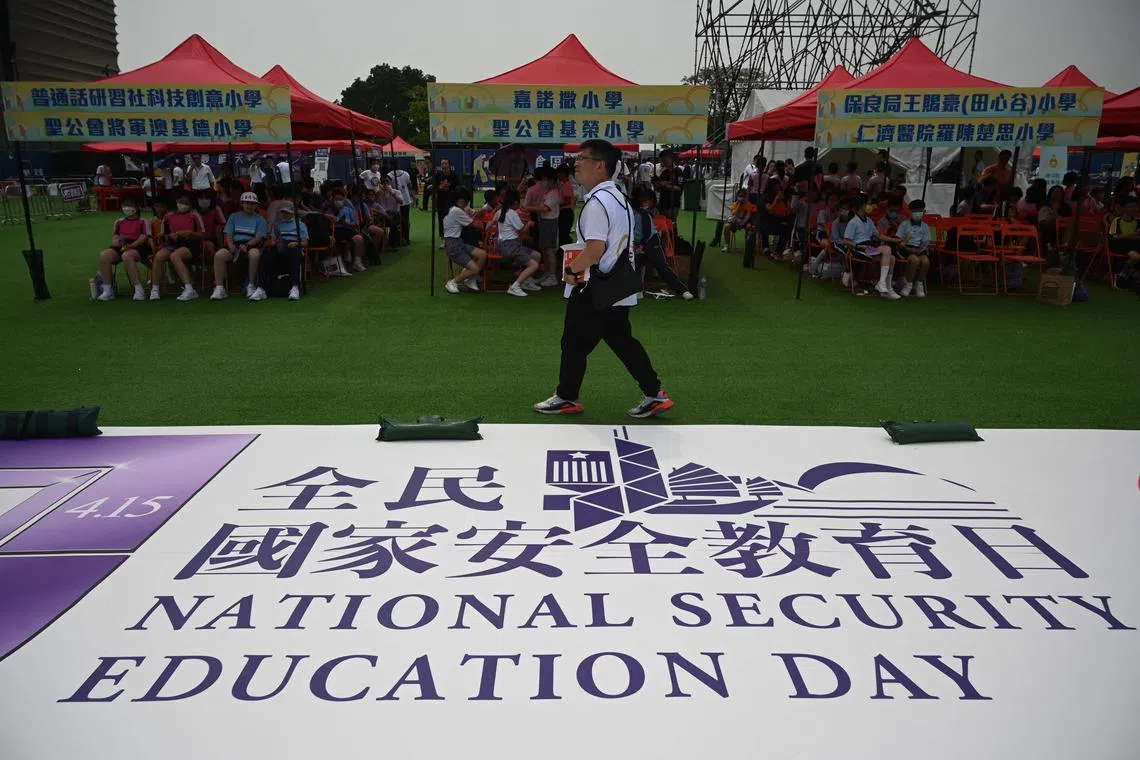Hong Kong: Key events since the 1997 handover
Sign up now: Get insights on Asia's fast-moving developments

A sea parade and fly-past in Hong Kong marking the 26th anniversary of its handover from British to Chinese rule on July 1.
PHOTO: REUTERS
Follow topic:
Hong Kong has had a turbulent history since it was handed over from Britain to China 26 years ago.
Here are some key dates:
1997: The handover
On July 1, 1997, at midnight, Hong Kong is returned to Chinese sovereignty after 156 years of British rule.
The tiny territory has its own mini-Constitution that governs its autonomy as a Special Administrative Region within China. Beijing promises a “one country, two systems” approach to the territory, meaning it will maintain freedoms that are not available to mainland Chinese.
The city is governed by a chief executive, chosen by a Beijing-controlled committee. Laws are passed by a legislative council, of which a minority of members are democratically elected.
Financial, then health crisis
In October 1997, just months after the handover, the Asian financial crisis grips Hong Kong, plunging the banking hub into an economic slowdown.
Five years later, severe acute respiratory syndrome (Sars) kills 299 people in Hong Kong and 1,800 worldwide, devastating Asian economies.
2003: China steps in, national security Bill
Beijing seeks to relaunch Hong Kong’s economy, moving in 2003 to gradually lift Customs barriers on Hong Kong products exported to the mainland.
Travel restrictions on Chinese from the mainland are eased, boosting tourism numbers.
In July 2003, an unprecedented half a million of Hong Kong’s population of seven million march against an unpopular national security Bill, which they see as an attempt by Beijing to restrict their freedoms.
The Bill is subsequently dropped – a rare government climbdown.
2004: Calls for more democracy
In January 2004, 100,000 people march through the city calling for more democracy, bringing to a head a simmering row over the Constitution’s lack of clarity on electing lawmakers. China in April rules out a swift change.
In July, hundreds of thousands of protesters again come out to demand more democracy.
2007: Universal suffrage promised
In 2007, Beijing schedules for 2017 the first democratic election of the chief executive, and for 2020 elections to the legislative council.
The promises disappoint pro-democracy demonstrators who were demanding universal suffrage from 2012.
2014: Umbrella Movement
In 2014, Beijing proposes a limited version of universal suffrage – Hong Kongers will be able to choose from a small group of Beijing-vetted candidates.
The announcement sparks a 79-day occupation of major thoroughfares known as the “Umbrella Movement”.
The protesters secure no concessions from Beijing, an outcome that prompts a minority of protesters in subsequent years to harden their positions, including advocating Hong Kong’s independence.
2019: Massive protests
In 2019, the Hong Kong government tries to fast-track a Bill through the legislature that would allow extraditions to China’s Communist Party-controlled courts.
The move sparks the biggest protests
Millions take to the streets during seven months of unrest, while a smaller section of hardcore protesters frequently battle police in often-violent confrontations that see thousands arrested.
The movement soon morphs into a new call for democracy and police accountability but is eventually suppressed.

Protesters marching outside Victoria Park in Hong Kong on June 16, 2019.
ST PHOTO: LIM YAOHUI
2020: Covid-19 hits
In January 2020, Hong Kong is one of the first territories to be affected by the coronavirus pandemic.
The executive takes drastic measures, including a ban on public gatherings,
2020: National Security Law
In June 2020, Beijing passes a national security law
China’s security agencies will be able to operate publicly in the city for the first time.
Beijing will have jurisdiction over some cases, toppling the legal firewall that has existed between Hong Kong and mainland courts.
Calls for independence or greater autonomy are banned.
The move sees most pro-democracy leaders either jailed, giving up politics or fleeing abroad.
Several countries say the law has ended the principle of “one country,two systems” approach,

Children playing a giant board game on National Security Education Day in Hong Kong on April 15, 2023.
PHOTO: AFP
2021: Electoral reform
In March 2021, China approves a radical “patriots-only” reform of the electoral system,
Under the new rules, only those deemed politically loyal can stand for office, and it drastically curtails the number of directly elected seats.
2022: Xi visits
Chinese leader Xi Jinping visits Hong Kong for the 25th anniversary of the handover,
He praises the “one country, two systems” model, saying there is “no reason at all to change and it must be upheld in the long run”.
Hong Kong’s former security chief John Lee, who oversaw the clampdown on the pro-democracy movement, is sworn in as the city’s new leader

